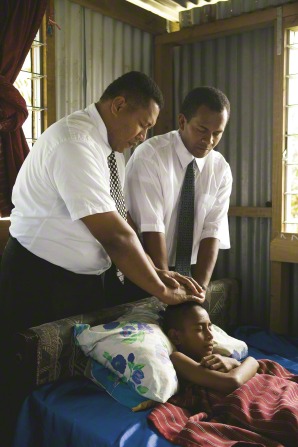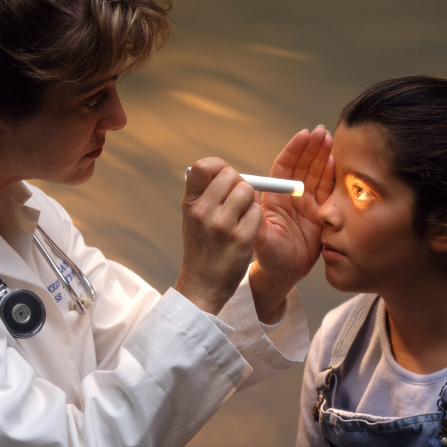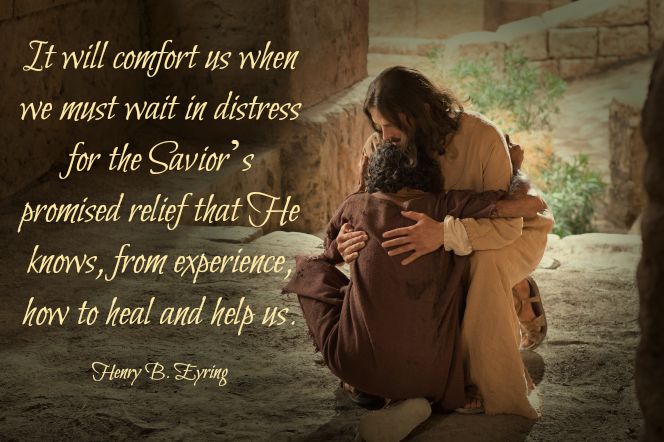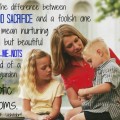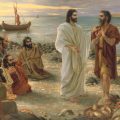Illness and injuries are facts of life here on earth. Sometimes it’s just a little cold or scrape, and other times it’s more serious. Where we turn in times of medical crises can depend on our religious beliefs. For people of certain faiths, their religious convictions prohibit the use of some or all modern medical treatments. Instead, they rely on prayers and spiritual healers. Others have no religious objections to visiting doctors and hospitals, and still others prefer natural or holistic treatments. Where do Mormons fit into this spectrum? Members of The Church of Jesus Christ of Latter-day Saints believe in both the power of faith and the blessings of modern medicine. The two are inextricably linked. Elder Dallin H. Oaks said:
The use of medical science is not at odds with our prayers of faith and our reliance on priesthood blessings. When a person requested a priesthood blessing, Brigham Young would ask, “Have you used any remedies?” To those who said no because “we wish the Elders to lay hands upon us, and we have faith that we shall be healed,” President Young replied: “That is very inconsistent according to my faith. If we are sick, and ask the Lord to heal us, and to do all for us that is necessary to be done, according to my understanding of the Gospel of salvation, I might as well ask the Lord to cause my wheat and corn to grow, without my plowing the ground and casting in the seed. It appears consistent to me to apply every remedy that comes within the range of my knowledge, and [then] to ask my Father in Heaven … to sanctify that application to the healing of my body.”
Latter-day Saints believe that both faith and medicine are important tools to aid us in the healing process.
Mormons and Medicine: A Historical Perspective

The Doctor, by Luke Fildes. In the early days of The Church of Jesus Christ, leaders emphasized common sense and safe, conservative treatments as medical science was in its infancy.
History offers us a unique perspective for our world today—including the history of medical science. It also offers insight into the counsel given by prophets in the early days of The Church of Jesus Christ. Elder Cecil O. Samuelson wrote:
At the time the Church was established (1830), medical science was in its infancy. Fundamental mechanisms of disease were just beginning to be understood, and modern diagnostic approaches and notions about infection were only embryonic. Medical treatment for most conditions was ineffective and sometimes harmful. Early Church leaders, including the Prophet Joseph Smith and President Brigham Young, urged reliance on faith and priesthood blessings and treatment with herbs and mild food.
Some of this apprehension was based on experiences of the early Church leaders and their families. It is also important to remember that 19th century medicine was very different from what doctors practice today. Elder Samuelson continued:
In the early nineteenth century, practitioners trained in orthodox medicine relied heavily on bleeding and calomel (mercurous chloride) purges, treatments that were sometimes fatal. Joseph Smith lost his brother Alvin in 1823 when calomel, prescribed for what may have been appendicitis, lodged in his intestines, causing gangrene. This was one of several unfortunate experiences that supported a family inclination against these methods (sometimes called “heroic medicine”).
Other practitioners, including Willard Richards, an early member of the Quorum of the Twelve, were trained (most often self-trained) in the Thomsonian system, which used various botanical products, water, and massage. Neither allopathic nor homeopathic in orientation, Thomsonian medicine was perhaps closest to today’s naturopathy. While not aggressively dangerous, as were many of the then common practitioners of quackery or some of the orthodox practitioners, most often the Thomsonians could do little more than offer kindness.
Church members were encouraged to use common sense and safe, conservative treatments. But Latter-day Saint leaders also saw the need for doctors in some instances. When the Prophet Joseph was a boy, a talented doctor operated on his leg that had become infected. The only anesthetic the doctor could offer was whiskey, and the 8-year-old declined. He underwent the surgery holding his father’s hand, and the doctor was able to save his leg. But medical advancements brought a new perspective for the Prophet Brigham Young, who succeeded Joseph Smith. Elder Samuelson wrote:
Medical science advanced rapidly in the latter half of the nineteenth century, and Brigham Young began to rely on physicians for more of his own medical care. During the decade beginning in 1867, he was responsible for sending several of the most gifted young men and women in the Church, among them his nephew Seymour Young, to medical schools in the East.
In addition to sending church members to medical schools, Latter-day Saints were also instrumental in setting up hospitals in Utah. These include LDS Hospital and Primary Children’s Hospital in Salt Lake City. Although these and other facilities were sponsored by The Church of Jesus Christ at one time, they were donated to a new nonprofit organization in the 1970s.
The Blessing of Scientific Knowledge
As medical science has advanced throughout the modern age, so has our increased reliance on it. As Elder Oaks, said, this is not at odds with faith. Elder Delbert L. Stapley said,
The source of all knowledge comes from God to man for man’s benefit, guidance, and blessing. God expects man to use wisely the knowledge, scientific or otherwise, that he releases for man’s benefit. … If medical men have acquired skills and medical cures for the ills of man, shouldn’t they be used as part of the healing requirement?
Medical science is just a link in the whole plan and process of healing. The advances in medicine and medical treatment are providing cures for diseases and afflictions that in the past may have been terminal. An afflicted body fortified with medical help has great natural power to heal itself.
And, indeed, this medical help has also increased our life expectancy. At the dawn of the 21st century, President Gordon B. Hinckley said,
As we close this great and remarkable century, I stand in awe of the blessings we have. I have now lived through 90 years of this century. When I think of the wonders that have come to pass in my lifetime—more than during all the rest of human history together—I stand in reverence and gratitude… It is all so miraculous and wonderful. I think of the giant steps made in medicine and sanitation. I think that all of the great medicines we use, with the possible exception of aspirin, have come forth in this century, including the antibiotics that have healed and made well generations of beneficiaries. When I was born, the life expectancy of a man in the United States was 50 years. Today it is more than 75. To think that 25 years have been added to the life of an average man in North America and western Europe is miraculous.
Thus, Mormons believe that this knowledge should be used for our benefit, to increase the quality and length of our lives.
Prayers and Priesthood Blessings
Medical science is an important tool to help us heal. However, it is not the only one. Elder Oaks said there are multiple aspects to use in “healing the sick —by medical science, by prayers of faith, and by priesthood blessings.” Each can help us on the road to recovery—however short or long the road. Elder Oaks said:
Of course we don’t wait until all other methods are exhausted before we pray in faith or give priesthood blessings for healing. In emergencies, prayers and blessings come first. Most often we pursue all efforts simultaneously. This follows the scriptural teachings that we should “pray always” (Doctrine & Covenants 90:24) and that all things should be done in wisdom and order.
We know that the prayer of faith, uttered alone or in our homes or places of worship, can be effective to heal the sick. … Many Latter-day Saints have experienced the power of faith in healing the sick. … Miracles happen when the authority of the priesthood is used to bless the sick.
Prayer can be individual, family or in a group setting. It is different from a priesthood blessing, because a priesthood blessing is given by the laying on of hands by one who has the authority of the priesthood. Both can help heal those who are sick, and both require faith and action on our part. Elder Richard G. Scott explained:
One way the Lord helps us is through priesthood blessings. When a worthy priesthood bearer is led to pronounce specific blessings, we can be greatly comforted. Yet there is no guarantee of outcome without effort on our part. Appropriate use of priesthood authority opens a channel of help where the outcome is consistent with the will of the Lord. The blessing resolves those things which are beyond our own capacity to influence either personally or with the help of others. Yet we must do our part for the blessing to be realized. We must strive to be worthy and to exercise the requisite faith to do what we are able. Where it is intended that others help, we must use that help also. It is through the combination of our doing what is within our power to accomplish and the power of the Lord that the blessing is realized.
Once I was awakened by a call from an anxious mother. Her premature child was not expected to survive the night. She asked for a priesthood blessing. … There came a strong prompting to bless the child to recover. The worthy mother continued professional treatment and exercised her faith. The Lord responded with the additional blessing needed. And the child recovered.
The child was healed only after the faith and action of the mother. Prayers and priesthood blessings are not at odds with medical treatments, and are often used in conjunction with them.
The Spiritual Component of Healing
Prayers and priesthood blessings aid in the physical aspect of recovery, but there is another one— spiritual. Indeed, the spiritual component of healing is so vital that even the medical community is taking notice. Elder Alexander B. Morrison said,
Wise health professionals—whatever their academic training or orientation, be it primarily medical or psychological—increasingly are aware that spirituality is a significant component of their therapeutic resources. As recently as a decade ago only a handful of medical schools in the United States offered courses in spirituality and healing, but now more than half do. Particularly with religiously devout patients, evidence is beginning to show that spiritual approaches to the psychotherapy of depression, for example, are at least as effective as those that are purely secular. A growing number of physicians and psychotherapists now use spiritually oriented approaches and interventions in treating patients with both physical and mental illnesses.
Loma Linda University has compiled a booklet of various religions and their religious beliefs on medicine. Rather than being a comprehensive work, it is an acknowledgement that spirituality and healing are intertwined. The introduction reads:
No one imagines, of course, that such concise descriptions of complex religious traditions represent detailed scholarly analyses. The booklet’s purpose is more modest— to open windows on key elements of faith traditions so that patients who belong to these traditions may receive more considerate care.
Elder Boyd K. Packer said:
I … asked a doctor of family medicine how much of his time was devoted purely to correcting physical disorders. He has a large practice, and after thoughtfully considering, he answered, “Not more than 20 percent. The rest of the time I seem to be working on problems that very much affect the physical well-being of my patients but do not originate in the body.
“These physical disorders,” the doctor concluded, “are merely symptoms of some other kind of trouble.”
… There is a spirit in man; to ignore it is to ignore reality. There are spiritual disorders, too, and spiritual diseases that can cause intense suffering.
The body and the spirit of man are bound together. Often, very often, when there are disorders, it is very difficult to tell which is which.
It is for this reason that the spiritual component to healing is so important. I had a very dear friend who was struggling with some chronic health challenges. She had also suffered abuse and other trauma in childhood. One day while talking she said, “I finally realized that my spirit needs to be healed. My spirit is saying, ‘You’ve taken care of everything and everybody else, and now it’s time to heal me.’” Her physical recovery was intertwined with her spiritual healing.
Healing Requires Faith, Patience— and sometimes Persistence
Oftentimes, healing requires not only faith but also patience. Sometimes receiving a priesthood blessing is only the first step on the road to full recovery. Elder Scott said,
It is a sobering responsibility for those who bear the priesthood to act as agents of the Lord to help those in need. That trust requires faith, worthiness, and a sensitivity to the promptings of the Spirit to communicate the will of the Lord. Also, it is a sobering responsibility for those who receive a blessing to exercise faith, to express gratitude for every degree of improvement observed, and to do all within their power to resolve the need.
Oftentimes, there is more work for us to do individually after we receive a priesthood blessing. Elder Morrison said,
Some persons who are ill, who have received a priesthood blessing and have prayed fervently that their burdens might be lightened, may feel that they suffer from a lamentable lack of faith if they seek professional help for their affliction. They may even stop taking prescribed medication, thinking erroneously that their faith will replace the need for it. Such thinking is quite simply wrong. Receiving and acting upon professional advice and the concomitant exercise of faith are not in conflict. In fact, exercising faith may require following the advice of experienced health professionals.
The blessings of modern medicine work in conjunction with our prayers of faith and priesthood blessings to help us heal in times of sickness.
But If We are Not Healed…
It is important to remember that not everyone is healed and made whole. Sometimes the answer to our heartfelt petition is no. Elder Lance B. Wickman said,
I know from poignant personal experience that there is no night quite so dark as the loss of a child. Neither is there any day quite so long and exhausting as the relentlessness of caring for a child crippled in form or faculty. … The overarching question asked by the bereaved and the burdened is simply this: Why? Why did our daughter die, when we prayed so hard that she would live and when she received priesthood blessings? Why are we struggling with this misfortune, when others relate miraculous healing experiences for their loved ones? These are natural questions, understandable questions. But they are also questions that usually go begging in mortality. The Lord has said simply, “My ways [are] higher than your ways, and my thoughts than your thoughts” (Isaiah 55:9). As the Son’s will was “swallowed up in the will of the Father” (Mosiah 15:7), so must ours be. …
But the Lord has not left us comfortless or without any answers. As to the healing of the sick, He has clearly said: “And again, it shall come to pass that he that hath faith in me to be healed, and is not appointed unto death, shall be healed” (Doctrine & Covenants 42:48; emphasis added). All too often we overlook the qualifying phrase “and is not appointed unto death” (“or,” we might add, “unto sickness or handicap”). Please do not despair when fervent prayers have been offered and priesthood blessings performed and your loved one makes no improvement or even passes from mortality. Take comfort in the knowledge that you did everything you could. Such faith, fasting, and blessing could not be in vain! That your child did not recover in spite of all that was done in his behalf can and should be the basis for peace and reassurance to all who love him! The Lord—who inspires the blessings and who hears every earnest prayer—called him home nonetheless. All the experiences of prayer, fasting, and faith may well have been more for our benefit than for his.
Mormons believe in the power of priesthood blessings, faith and prayer and the blessings of modern medicine, but they also believe that God is in charge. Sometimes the answer is no. That does not diminish the power of faith, blessings or medicine. Just as illness and injuries are part of life here in mortality, so is death. Faith, priesthood blessings and modern medicine can only heal if it is the will of God. Life—and death—are in His hands.

